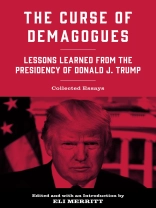The Curse of Demagogues: Lessons Learned from the Presidency of Donald J. Trump is a collection of thirty-two essays by twenty-two writers that makes the case that the pathway back to a healthy American democracy is for citizens, first, to understand demagogues and, second, to defend against them.
As Joseph J. Ellis, Pulitzer Prize-winning historian, writes in his essay in the collection:
‘There have been two occasions in American history when the fate of the republic was placed at risk. The first was the Civil War . . . The second was the Great Depression . . . We are currently on the cusp of a third serious challenge to our republican roots, which has emerged in the person of the first full-scale demagogue who was elected president . . . This is the chief reason why the looming election is the most important political event of our lifetime.’
–JOSEPH J. ELLIS, Pulitzer Prize-winning author of Founding Brothers and The Cause
Other contributing writers include Jill Abramson, Michael Austin, Frank O. Bowman, III, Curtis A. Bradley, Michael A. Cohen, Barbara Comstock, Jeff Flake, Megan Garber, Bryan Garsten, Jennifer Mercieca, Eli Merritt, Yaël Ossowski, Darryl Paulson, Frederic C. Rich, James Risen, Michael Signer, Andrew Sullivan, Andrew Trees, Jesse Wegman, and Richard Ashby Wilson.
More than any other book in print, The Curse of Demagogues makes the story of Donald Trump’s rise to the White House coherent and understandable. Trump, a demagogue, gained ascendancy in a laissez-faire political culture wherein neither the Republican Party nor the other gatekeepers of democracy, including the news media, effectively counteracted him. Once in the highest office in the land, Trump devolved into authoritarianism in order to retain power, as demagogues are well-known to do.
The book has three overarching aims. First, it constitutes a short history of Trump’s years in the White House (and his first two campaigns for president) as told from the perspective of scholars, journalists, and legal experts who specifically warned the public about his dangers as a demagogue in real time. Second, the collection is a detailed primer on demagogues and the multifarious ways they poison the vital organs of constitutional democracy. Third, the book is an urgent call to study, debate, research, learn, and, critically, to restore gatekeepers to their essential role as defenders of democracy against demagogues.
To revivify our once great democracy, we must defend it against demagogues by strengthening gatekeeping systems within political parties, the media, and the U.S. Congress (powers of impeachment, conviction, and disqualification from future office) and through vigorous civics, ethics, and media literacy education K-12 and beyond.
As Eli Merritt, editor and contributor, writes in the book’s introduction:
‘The enemy of democracy is not a Democrat or Republican. It is a demagogue.’
Mengenai Pengarang
Eli Merritt, editor and contributor, is a psychiatrist and political historian at Vanderbilt University. He has written for The New York Times, Los Angeles Times, Chicago Tribune, and American Journal of Legal History, among other publications. He writes the Substack newsletter American Commonwealth. Other contributing writers include Jill Abramson, Michael Austin, Frank O. Bowman, III, Curtis A. Bradley, Michael A. Cohen, Barbara Comstock, Joseph J. Ellis, Jeff Flake, Megan Garber, Bryan Garsten, Jennifer Mercieca, Yaël Ossowski, Darryl Paulson, Frederic C. Rich, James Risen, Michael Signer, Andrew Sullivan, Andrew Trees, Jesse Wegman, and Richard Ashby Wilson.












